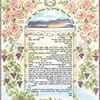The following is the basic ketubah text. Minor — but vital —changes are made in the contract depending on various factors — chiefly among them the bride's previous marital history.
ב"ה
... בשבת ... לחדש ... שנת חמשת אלפים ושבע מאות ... לבריאת עולם למנין שאנו מנין כאן ... איך ... בן ... אמר לה להדא ... בת ... הוי לי לאנתו כדת משה וישראל ואנא אפלח ואוקיר ואיזון ואפרנס יתיכי ליכי כהלכות גוברין יהודאין דפלחין ומוקרין וזנין ומפרנסין לנשיהון בקושטא ויהיבנא ליכי ... כסף זוזי ... דחזי ליכי ... ומזוניכי וכסותיכי וסיפוקיכי ומיעל לותיכי כאורח כל ארעא וצביאת מרת ... דא והות ליה לאנתו ודן נדוניא דהנעלת ליה מבי ... בין בכסף בין בזהב בין בתכשיטין במאני דלבושא בשמושי דירה ובשמושא דערסא הכל קבל עליו ... חתן דנן ב... זקוקים כסף צרוף וצבי ... חתן דנן והוסיף לה מן דיליה עוד ... זקוקים כסף צרוף אחרים כנגדן סך הכל ... זקוקים כסף צרוף וכך אמר ... חתן דנן אחריות שטר כתובתא דא נדוניא דן ותוספתא דא קבלית עלי ועל ירתי בתראי להתפרע מכל שפר ארג נכסין וקנינין דאית לי תחות כל שמיא דקנאי ודעתיד אנא למקני נכסין דאית להון אחריות ודלית להון אחריות כלהון יהון אחראין וערבאין לפרוע מנהון שטר כתובתא דא נדוניא דן ותוספתא דא מנאי ואפילו מן גלימא דעל כתפאי בחיי ובתר חיי מן יומא דנן ולעלם ואחריות וחומר שטר כתובתא דא נדוניא דן ותוספתא דא קבל עליו ... חתן דנן כחומר כל שטרי כתובות ותוספתות דנהגין בבנת ישראל העשויין כתיקון חכמינו ז"ל דלא כאסמכתא ודלא כטופסי דשטרי וקנינא מן ... בן ... חתן דנן למרת ... בת ... דא על כל מה דכתוב ומפורש לעיל במנא דכשר למקניא ביה הכל שריר וקים
נאום ...
נאום ...
English Text:
On the [...] day of the week, the [...] day of the [Hebrew] month of [...], the year [...] after the creation of the world, according to the manner in which we count [dates] here in [...], the bridegroom [...] son of [...] said to this [...] daughter of [...], “Be my wife according to the law of Moses and Israel. I will work, honor, feed and support you in the custom of Jewish men, who work, honor, feed, and support their wives faithfully. I will give you the settlement of [...] silver zuzim, which is due you according to [...] law, as well as your food, clothing, necessities of life, and conjugal needs, according to the universal custom.”
Ms. [...] agreed, and became his wife. This dowry that she brought from her father’s house, whether in silver, gold, jewelry, clothing, home furnishings, or bedding, Mr. [...], our bridegroom, accepts as being worth [...] silver pieces (zekukim).
Our bridegroom, Mr. [...] agreed, and of his own accord, added an additional [...] silver pieces (zekukim) paralleling the above. The entire amount is then [...] silver pieces (zekukim).
Mr. [...] our bridegroom made this declaration: “The obligation of this marriage contract (ketubah), this dowry, and this additional amount, I accept upon myself and upon my heirs after me. It can be paid from the entire best part of the property and possessions that I own under all the heavens, whether I own [this property] already, or will own it in the future. [It includes] both mortgageable property and non-mortgageable property. All of it shall be mortgaged and bound as security to pay this marriage contract, this dowry, and this additional amount. [it can be taken] from me, even from the shirt on my back, during my lifetime, and after my lifetime, from this day and forever.”
And the surety for all the obligations of this marriage contract (ketubah), dowry and the additional sum has been assumed by [...] the said groom, with the full obligation dictated by all documents of ketubot and additional sums due every daughter of Israel, executed in accordance with the enactment of our Sages, of blessed memory. It is not to be regarded as an indecisive contractual obligation nor as a stereotyped form.
And we have completed the act of acquisition from Mr.[...] son of [...] our bridegroom, to Ms. [...] daughter of [...], regarding everything written and stated above, with an article that is fit for such a kinyan. And everything is valid and confirmed.
[...] son of [...] Witness
[...] son of [...] Witness







Join the Discussion